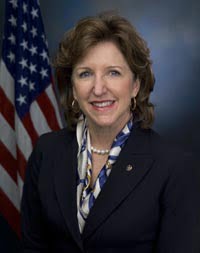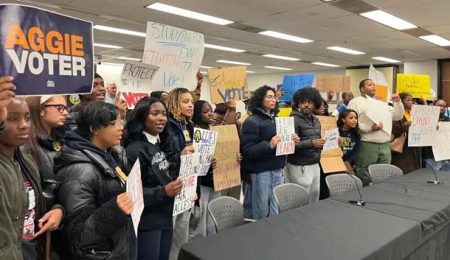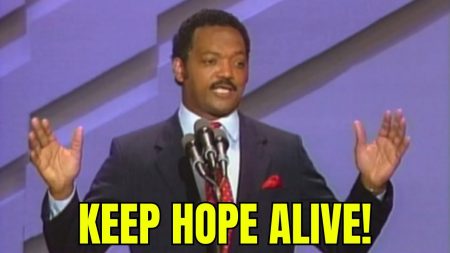Senator Hagan Talks to Urban News

In an exclusive interview with North Carolina’s Democratic Senator Kay Hagan, The Urban News learned first-hand the difficulty of getting things done in Washington, as well as some of the experiences that can move elected officials to action. We also learned, again, how difficult it is to get a clear, direct answer to policy questions.
In our discussion, which took place on Jan. 22, Hagan was excited about the previous day’s inaugural events. “It was an exciting day for me personally,” she said, “but as I looked out over the crowd of 800 thousand to a million people witnessing the inauguration, what was most striking to me was that it occurred on the holiday celebrating Dr. Martin Luther King, Jr. I know that in North Carolina it was a day of service for many people, but we also had thousands of North Carolinians in Washington.”
Inspired by the inaugural crowds
Hagan mentioned that she had a chance to meet with the Asheville High Band, under the direction of Will Talley, who performed at the inaugural parade as well as at evening events. “It was wonderful that Asheville High School’s band not only marched but also received such great honors, she said.” The band was chosen Grand Champion, the highest honor awarded for Inaugural Festival concert performances, and the judges who chose AHS’s band for the championship also awarded it a gold rating.
Seated directly behind and to the right of President Obama on the inaugural dais, Hagan said she was thrilled “to look out on the mall to see so many people gathered there, and beyond them the Washington Monument, then the Lincoln Memorial. And beyond that is the new memorial to Martin Luther King.”
“Dr. King,” she said, “brought our nation closer to achieving its ideals: justice, inclusion, equality. And partly as a result of what he did, when you look around the Congress you see it’s a much more representative body than before.”
Divided government, unified needs
When asked her thoughts about any particulars of President Obama’s second inaugural speech, Hagan noted one remark that struck her more than anything else. “The president said, ‘We were made for this moment, as long as we seize it together.’”
And, she added, it’s essential that all those in Congress – Democrats, Republicans, Independents, in both the House and the Senate – work together to tackle what she considers the paramount problem facing the country, and North Carolina in particular: jobs. The state has the fifth-highest unemployment rate in the entire nation, and working together towards job growth is the essential responsibility of the U. S. government, she said.
Filibuster reform
We asked the senator how that could be accomplished without Senate reforms to filibuster rules that allow a small minority to obstruct any and all legislation. In the six years since Democrats won their Senate majority, minority Republicans have used the filibuster more than 385 times to stall or kill legislation – more than in the entire 60-year period from 1920 to 1980, and compared to a single one during the six years that Lyndon Johnson was majority leader in the 1950s.
Although Democratic Senators Jeff Merkley (OR), Tom Udall (NM), and Tom Harkin (IA) introduced a filibuster reform resolution designed to increase transparency, restore accountability and foster debate, Senate Majority Leader Harry Reid shot down their plan in favor of much weaker changes. Negotiations with Minority Leader Mitch McConnell led to a handful of procedural revisions that will limit debate only in certain circumstances but still allow a determined minority to frustrate the will of the majority – and possibly sabotage the president’s entire second-term agenda.
“I’m just as frustrated as the public is – because one individual can stop legislation in its tracks,” Hagan told the Urban News. “When I look at the problems of inaction and think of the past six years, the filibuster has been used, I think the total is now 386 times.” But, she said, “On the other side it’s important to protect minority parties’ rights in the Senate.”
Hagan voted for Reid’s watered-down reforms, which were the only option on the table, but it remains to be seen whether they will make any real difference in getting legislation passed.
No-answer answers on the economy
Asked about economic issues, Hagan accurately diagnosed the reason for the current large deficits. “We had the Bush tax cuts, we’ve had two wars that weren’t paid for, and a prescription drug program that wasn’t paid for.” And in analyzing those long-term financial issues, she said, “We have to look at the huge problem facing our country with our national debt and our deficits. The House and Senate have got to come together to work out a solution to those problems.” She pointed out that as a state legislator in North Carolina, the state house and senate had a balanced budget every year and managed to build a strong rainy-day fund.
The state, of course, is required by its constitution to balance its budget, and it had enjoyed one-party control of both houses and the governor’s mansion for more than a decade when she served there. Unlike in the divided national government of the past few years, Democrats in Raleigh were able to accomplish their policy goals with very little effective opposition. Despite that difference between state and federal legislating, and the abuse of the filibuster by minority Republicans, Hagan feels strongly that working across the aisle is still possible.
“There’s a group of 10 Republicans and 10 Democrats who meet and talk about issues,” she said. “We can’t continue kicking the can down the road, and the best solution is to work together to find solutions. And it’s vital that we all work together to put Social Security on a strong footing for generations to come.”
“We have to deal with all these things together, and we have to do it soon. There is a whole host of end-of-February deadlines that we face: 1.2 trillion dollars in sequestration cuts; then the debt ceiling hits in late February, too, and in March we have to deal with the continuing resolution” under which spending is allowed despite there not being a new budget. “We have to deal with all those things in the next few months,” she said.
Confusion about Social Security
Social Security does not operate at a deficit. It is a self-supporting program supported by payroll deductions from current workers to benefit their predecessors. Its obligations are fully financed for another 25 years, and 75% paid for thereafter; with slight tweaks – raising the income level on which taxes are withheld – it will be able to pay full benefits for generations. That is the approach preferred by progressives and most Democrats, and the one taken by Ronald Reagan a generation ago.
Conservatives, however, prefer raising the retirement age at which retirees will be able to draw on the money they have put away for retirement throughout their lives – as suggested recently by a group of CEOs from the Business Roundtable. They also have tried repeatedly to make the program means-tested, moving it from a universal American program to a “support program” for the poor – a sure way to kill it off in the long run.
But few among the program’s opponents acknowledge that a 60-year-old who has worked in a warehouse or on a farm or repairing streets for 35 years has very different physical needs and limitations than a CEO who rides a limousine each day to sit in a six-hundred-dollar executive chair and work out on the handball courts. Moreover, retirement means something very different to those who rely on $1,100 for their entire monthly income than it does to those who spend that much in one night for dinner and a show.
Hagan does understand the difference; as she pointed out, her own father was a farmer, and she knows the physical hardship of that labor. But she was coy when asked specifically about which, if any, specific approaches – raising retirement for everyone, or making more income subject to withholdings – she supports and would vote for.
Borrowing and paying back
When asked about the viability of Social Security and other earned benefits like Medicare, and what to do to ensure their long-term strength, Hagan tried to put earned benefits in the same basket with “the entire debt and deficit issue.” But despite her lumping them together – as so many in Washington do – Social Security is not a cause of our annual deficit or long-term debt.
The program’s vast reserves have been tapped by our government for decades to cover deficits without raising taxes – anathema to Republicans since Ronald Reagan’s day. As a result, the U.S. government owes a great deal of money to the Social Security Trust Fund, just as it owes money to China for other loans. And in that sense, the money owed to the Trust Fund is part of the U.S.’s long-term debt.
But the fact that you owe the bank a lot of money doesn’t make the bank broke! Our government debt to the Social Security Trust Fund is no different than our debt to China: We borrowed it and we will pay it back,
Political future in red NC
North Carolina has undergone a political revolution of sorts between 2010 and 2012, with first the House and Senate, and then the governorship, changing from Democratic hands to Republican ones in two short years. What implications that reversal from a blue state that voted for Obama in 2008 and sent seven Democrats and six Republicans to the House in 2010, to one that supported Romney and elected nine Republicans and four Democrats in 2012, will have on Hagan’s reelection prospects remain to be seen.
She noted that she has held “Conversations with Kay” in all 100 counties in the state, and that she’s always glad to hear from her constituents. She praised her team of staff members both in Washington and around the state, especially those who provide constituent services to residents. “We have resolved more than twenty thousand cases of federal issues, and it’s important that people know that if they have a problem with the federal government, they can contact my office. We’ll do everything we can to help.”
As for her reelection, Hagan says she is focusing on “doing great work in the U.S. Senate. I’m doing my best to help get employment in North Carolina back to where it needs to be. I will leave no stone unturned, if it’s a good Democratic idea or a good Republican idea, we have to move forward together to get North Carolina citizens back to work.”







